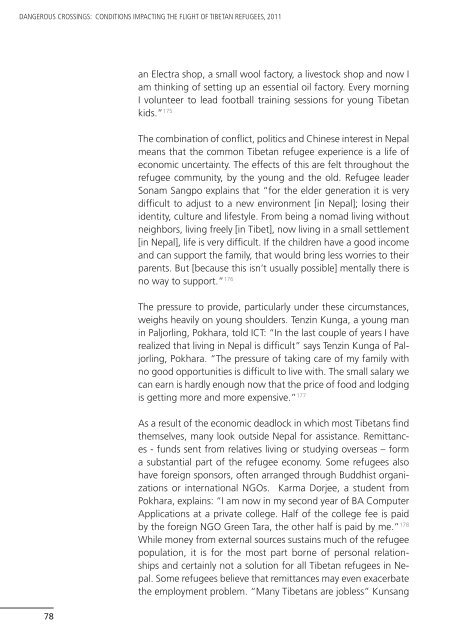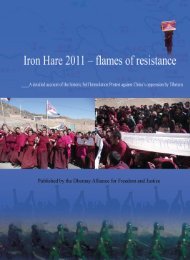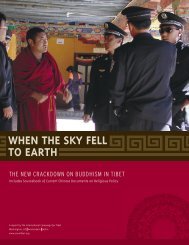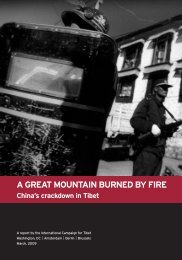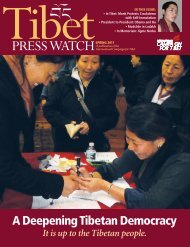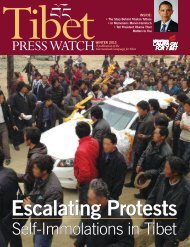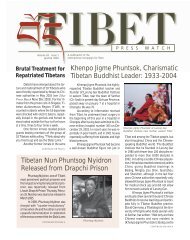DANGEROUS CROSSING: - International Campaign for Tibet
DANGEROUS CROSSING: - International Campaign for Tibet
DANGEROUS CROSSING: - International Campaign for Tibet
Create successful ePaper yourself
Turn your PDF publications into a flip-book with our unique Google optimized e-Paper software.
<strong>DANGEROUS</strong> <strong>CROSSING</strong>S: CONDITIONS IMPACTING THE FLIGHT OF TIBETAN REFUGEES, 2011<br />
78<br />
an Electra shop, a small wool factory, a livestock shop and now I<br />
am thinking of setting up an essential oil factory. Every morning<br />
I volunteer to lead football training sessions <strong>for</strong> young <strong>Tibet</strong>an<br />
kids.” 175<br />
The combination of conflict, politics and Chinese interest in Nepal<br />
means that the common <strong>Tibet</strong>an refugee experience is a life of<br />
economic uncertainty. The effects of this are felt throughout the<br />
refugee community, by the young and the old. Refugee leader<br />
Sonam Sangpo explains that “<strong>for</strong> the elder generation it is very<br />
difficult to adjust to a new environment [in Nepal]; losing their<br />
identity, culture and lifestyle. From being a nomad living without<br />
neighbors, living freely [in <strong>Tibet</strong>], now living in a small settlement<br />
[in Nepal], life is very difficult. If the children have a good income<br />
and can support the family, that would bring less worries to their<br />
parents. But [because this isn’t usually possible] mentally there is<br />
no way to support.” 176<br />
The pressure to provide, particularly under these circumstances,<br />
weighs heavily on young shoulders. Tenzin Kunga, a young man<br />
in Paljorling, Pokhara, told ICT: “In the last couple of years I have<br />
realized that living in Nepal is difficult” says Tenzin Kunga of Paljorling,<br />
Pokhara. “The pressure of taking care of my family with<br />
no good opportunities is difficult to live with. The small salary we<br />
can earn is hardly enough now that the price of food and lodging<br />
is getting more and more expensive.” 177<br />
As a result of the economic deadlock in which most <strong>Tibet</strong>ans find<br />
themselves, many look outside Nepal <strong>for</strong> assistance. Remittances<br />
- funds sent from relatives living or studying overseas – <strong>for</strong>m<br />
a substantial part of the refugee economy. Some refugees also<br />
have <strong>for</strong>eign sponsors, often arranged through Buddhist organizations<br />
or international NGOs. Karma Dorjee, a student from<br />
Pokhara, explains: “I am now in my second year of BA Computer<br />
Applications at a private college. Half of the college fee is paid<br />
by the <strong>for</strong>eign NGO Green Tara, the other half is paid by me.” 178<br />
While money from external sources sustains much of the refugee<br />
population, it is <strong>for</strong> the most part borne of personal relationships<br />
and certainly not a solution <strong>for</strong> all <strong>Tibet</strong>an refugees in Nepal.<br />
Some refugees believe that remittances may even exacerbate<br />
the employment problem. “Many <strong>Tibet</strong>ans are jobless” Kunsang


